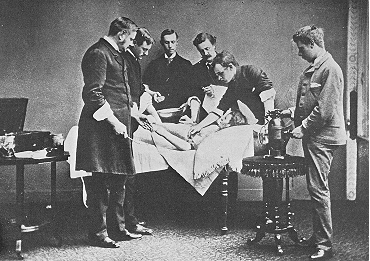top of page
Joseph Lister's Lasting Impact on Medicine
Although Lister's use of carbolic acid was not a long-term solution to infection and disease, he did have a lasting impact on the medical society.
Lister was one of the first physicians to truly consider antisepsis during surgery, and his initially successful techniques paved the way for antisepsis to become the basis of all surgical procedures. Because of this, the rate of death from infections decreased dramatically, and the amputation rate even lowered, as doctors were now able to combat already present infections in wounds. Lister also encouraged the use of gauze dressing during surgery so as not to allow external germs to enter the body cavities during a procedure (41).
Although Lister's work was at first controversial, the medical society eventually accepted and celebrated his work, and he was even awarded the Albert Medal with high praise from the Prince of Wales, saying "not only has the art of surgery been greatly promoted and human life saved in all parts of the world, but extensive industries have been created for the supply of materials for carrying the treatment into effect" (42).
Lister's work on an antisepsis technique permanently altered the medical world and set the path for its future, all beginning in response to the brutality of Civil War medicine.

41. "Joseph Lister," US History in Context, accessed February 20, 2015, http://ic.galegroup.com/ic/uhic.
42. "Sir Joseph Lister," The British Medical Journal 1, no. 1748 (1894): [Page #], accessed May 13, 2015, http://www.jstor.org/stable/20229046.
43. Lister Surgery Theatre with Spray Device, photograph, The Cleanroom Industry News Site, http://www.cleanroom.net/?p=13.
Joseph Lister using a carbolic acid spray device during a surgical procedure (43)
bottom of page